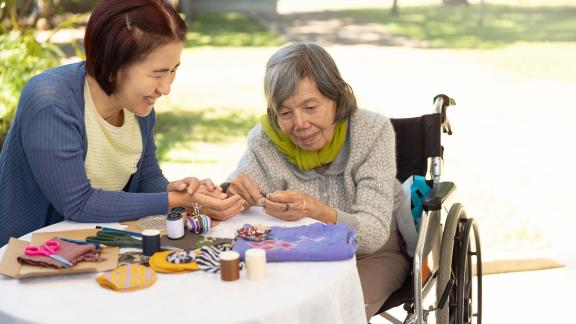Supporting staff with unpaid caring responsibilities

West Yorkshire Health and Care Partnership have introduced a flexible working arrangement using the Working Carers Passport as part of their carers programme.
Overview
West Yorkshire Health and Care Partnership have introduced a Working Carers Passport as part of their carers programme. Supporting staff carers was highlighted as an aim in their five-year plan. The carers passport scheme provides a straightforward way to document flexible working for employees who have unpaid caring responsibilities.
Key benefits and outcomes
-
Joint working with trusts has enabled changes in several areas such as recruitment processes and trust policies to reflect a carer friendly culture.
-
Embedding the carers agenda in the governance of the partnership has secured the full support of the leadership team.
-
Carer Confident Accreditation is now mentioned in recruitment literature and carries a quality mark to promote awareness of their carers support to prospective employees.
-
West Yorkshire Health and Care Partnership’s adoption of the passport has secured national recognition in the NHS People Plan, with the passport set to reach 56,000 working carers across the NHS.
What the organisation faced
A survey in 2019 showed that only 20 per cent of unpaid carers among NHS staff shared their carer status with their manager, meaning they were under increasing pressure in and outside of work without any support. This can impact on their personal health, finance, and wellbeing.
Based on the latest NHS staff survey it’s estimated that there could be up to one in three of the NHS workforce currently balancing working and caring responsibilities, so it was important for West Yorkshire Health and Care Partnership to ensure that working carers felt more supported, valued and listened to.
They wanted to create a culture where carers felt able to discuss their situation and felt empowered to work with their manager to find solutions, without the risk of judgement.
What the organisation did
All local NHS hospital trusts were invited to join a project team with the aim of working together to find and implement possible solutions. A full-time member of staff, Fatima Khan-Shah, was recruited to lead the working carers project. The project included both acute trusts and local mental health trusts, community trusts, local councils and clinical commissioning groups (CCGs).
After discussions with local NHS working carers, local voluntary caring groups and more experienced organisations, the Working Carers Passport was presented by Carers UK as a possible solution.
A Working Carers Passport is a record that can be printed off on paper to provide a physical copy, or it can be stored electronically. It identifies the carer and sets out an offer of support, services or other benefits. In West Yorkshire Health and Care Partnership’s case, it is an agreement between a member of staff who has caring responsibilities and their manager. The scheme provides a straightforward way to document flexible working that can be carried into an employee’s future roles, so if a person moves jobs, a manager will know the member of staff’s situation, cutting down on unnecessary meetings and paperwork.
Dedicated intranet pages were created for working carers and special training for managers was introduced to help them have sensitive conversations with their staff about their caring responsibilities.
New competencies, including identifying the carer and carer passport holders, were introduced into the NHS electronic staff record system (ESR). Improvements to the process are ongoing, so carers can record their status in a similar way to other protected characteristics.
Results and benefits
By 2022, all West Yorkshire councils, CCG’s and all NHS trusts across the area have adopted the passport with several organisations applying for further accreditation through Carers UK to achieve the carer confident quality mark.
The West Yorkshire area has been reported to have the highest number of working carers identified, and the highest number of Working Carer Passports registered on ESR. Recently, NHS England has adopted the scheme on a national scale to support the implementation of the passport across all NHS trusts.
Many carers have said that the passport has been instrumental in them being able to continue with their caring and working responsibilities.
By supporting working carers with the Working Carers Passport, West Yorkshire Health and Care Partnership hope to retain 14,000 carers out of 43,000 NHS employees in West Yorkshire. Carers UK suggests that one carer saves the economy £19,000 a year. It is estimated that this can potentially save the West Yorkshire partnership £4.3 billion.
“I’m a carer for my son who has autism and I also work as a midwife. Combining the two is often impossible and I’ve often thought about leaving my job even though I love it. The Working Carers Passport is a godsend. It helped me to really think about where I could do with additional support and then I talked with my manager and we found things that would help.” NHS midwife and working carer.
Overcoming obstacles
Getting all organisations to prioritise working carers was a challenge. Carers were not previously high on the workforce, health and wellbeing, or HR agendas. However, once the business case was made, the project teams were very supportive of the approach and the willingness of the trusts to implement and promote the passport was inspiring.
Feedback from staff carers has highlighted that the process for adding competencies using the ESR system can be time consuming, so making this more streamlined is a priority.
Takeaway tips
-
Support from the senior team is essential.
-
Having carer champions (a working carer who provides support for other carers) and introducing manager training much earlier in the process would help promote the passport.
-
Work closely with communications colleagues to create more awareness of the Working Carer Passport.
Future plans
West Yorkshire Health and Care Partnership are developing the role of carer champions - who will promote awareness of and advocate for carers to ensure their organisation offers support. They will be a working carer themselves, providing visible support for other carers and understand the issues carers face to influence decision making within the organisation.
Contact details
Fatima Khan-Shah, associate director of long-term conditions and personalisation, West Yorkshire Health and Care Partnership. Email: f.khan-shah@nhs.net



